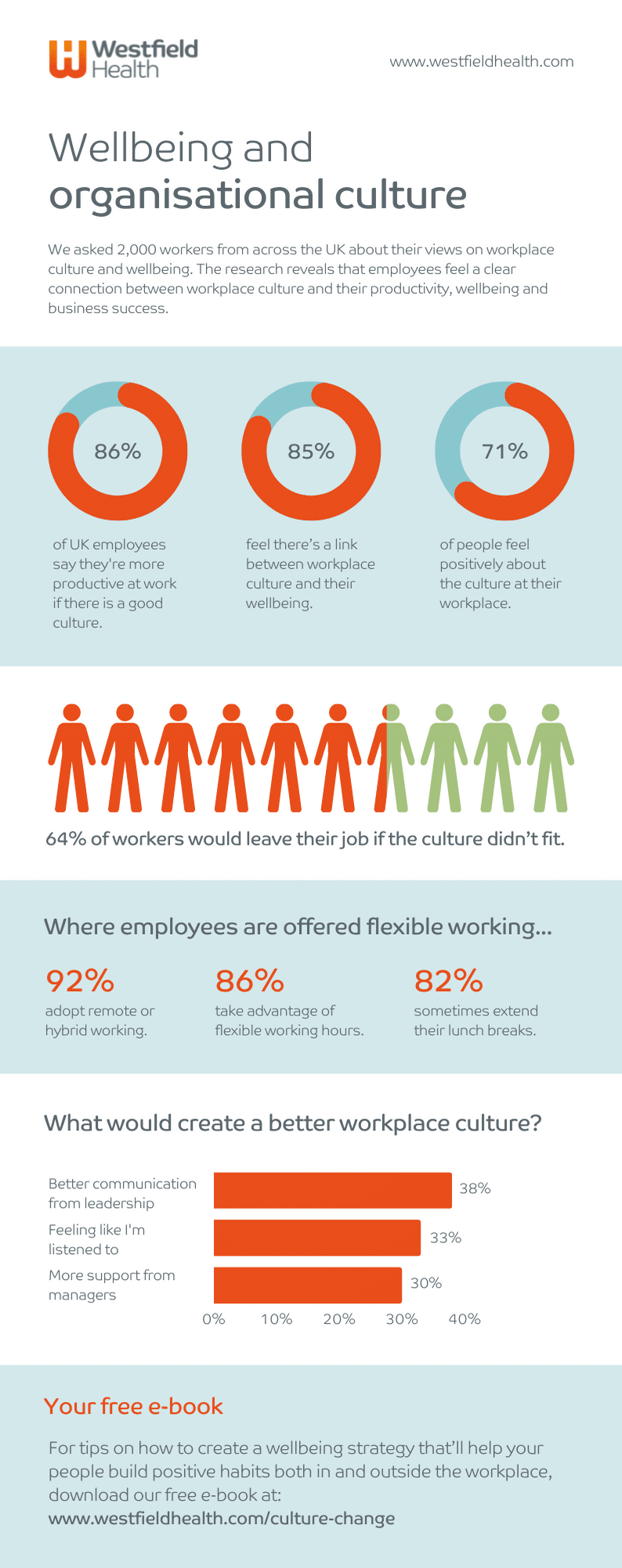We believe that every successful wellbeing strategy is backed up by a supportive culture, and our latest research confirms the importance of this link.
Last month, we asked 2,000 workers from across the UK about their views on workplace culture and wellbeing. The research reveals that employees feel a clear connection between workplace culture and their productivity, wellbeing and business success.
Results from the survey conclude that the vast majority (86%) of employees say they’re more productive at work if there’s a good culture, while 85% say there’s a link between workplace culture and wellbeing.
In fact, more than three-fifths of people (64%) say they would leave their job if they felt the company’s culture was not a good fit.
Key findings

- The majority of workers (86%) say they are more productive at work if there is a good culture, and 85% feel there’s a link between workplace culture and their wellbeing. These findings are backed up by numerous academic studies on culture, wellbeing and productivity at work.
- Over two-thirds (64%) of workers would leave their job if the culture didn’t fit, suggesting that organisations with poor culture are more likely to suffer from employee recruitment and retention issues.
- Only 65% of workers feel that the company’s CEO or leadership team promotes a positive culture. This provides an opportunity for leaders to get proactive and ensure their own actions reflect the culture changes they want to see in their business.
- When wellbeing is prioritised in company culture, employees are keen to make use of these benefits and initiatives. In workplaces that offer a culture of flexible working, for example, 92% of employees say they regularly use remote working and 86% use flexible hours.
What would improve company culture?
Nearly two-fifths (38%) of employees feel better communication from leadership would improve workplace culture. A third (33%) say they feel their culture would improve if management listened more, and 30% want more direct support from their leadership team.
Westfield Health CEO, Dave Capper, adds:
“At the minute, we’re seeing businesses face a battle for talent, and our research shows just how important culture is for workers. Not only does it improve productivity and wellbeing, but it could also make or break if someone leaves their job. Companies must work on their culture and wellbeing strategy to get this right if they want to avoid losing people.
“The easiest place to start is to listen to employees, find out what they want from you and build your strategy around that.
“In order to change workplace culture, senior leadership teams need to essentially practice what they preach. A strong strategy is vital, but it needs to be built on effective two-way communication.”
Culture and wellbeing strategy: free e-book
In light of these findings, we’ve put together a free interactive e-book, which takes you through everything you need to know to create a wellbeing strategy that’ll help your people build positive habits both in and outside the workplace.
Deciding to invest in workplace wellbeing is a great first step, but to make a lasting impact on employee health we must use insights to adapt our strategy, reshape workplace culture and empower our people to make positive lifestyle changes.
From influencing company culture to engaging leaders and business partners, the workbook contains three chapters of guides, ideas and resources to help you create an effective wellbeing programme for your business.
